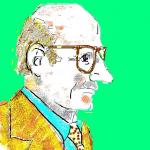In part one I generally took Tommie Kidd’s side on the question of who gets to decide which historical subjects qualify as evangelical. The dust-up on Twitter between the Baylor University historian and Jonathan Merritt, a journalist who writes for the Atlantic and other outlets, started when Kidd called the African-American poet, Phillis Wheatley, an evangelical. Merritt thought that was weird. My initial take was that it was odd for a journalist not to show a tad more deference to a prolific historian who writes for important university and trade presses.
But now I want to play the other side of this argument — hope to avoid throwing anyone under the bus — and agree somewhat with Merritt that calling Wheatley an evangelical is a tad strange. In his exchange with Merritt, highlighted here, Kidd appealed to a number of scholars who also call Wheatley an evangelical. Kidd receives reinforcement from John Fea, another accomplished colonial historian.
Here’s a novelty: why not call Wheatley a Congregationalist? She did belong, after all, to Old South Church in Boston, the third oldest Puritan congregation in the city which became part of the denomination today known as the United Church of Christ (which has included everyone from John Winthrop and Ben Franklin to Jeremiah Wright and Barack Obama). My own conviction is that institutions matter. When someone takes the time to go through interviews, attend worship regularly, make contributions — this involves a lot more commitment and religious identity than simply claiming to be an evangelical. What is more, Wheatley had no chance to join an evangelical organization like the later Evangelical Alliance or National Association of Evangelicals. (We all know she would be a regular blogger at the Gospel Coalition if she had had the chance, right?)
In which case, calling Wheatley an evangelical rather than a Congregationalist is arbitrary. Since she belonged to one institution and did not identify with an evangelical organization, claiming her for the evangelical side of religious markers is anachronistic. It says more about the religious landscape today than about her time. Historians, of all people, should avoid anachronisms.
Well, maybe Old South Church was an evangelical, revival friendly place. Near as I can tell, in Ben Franklin’s day the church was not and his minister Ebenezer Pemberton is said to have contributed to the liberalization (theologically) of Harvard. Just before Wheatley joined in 1771, Samuel Blair, a pro-revival Presbyterian, was pastor but he butted heads with the congregation over the Half-Way Covenant (a plan to allow for children of parents without a conversion narrative to be baptized — a departure from Puritan ideals). So the congregation did likely not see eye-to-eye with a pro-revival pastor and he left. Yet, Wheatley (an evangelical?) still joined.
All of which is to say that before identifying someone as an evangelical, a historian or journalist may want to assess where a person hangs his or her ecclesiastical hat. It may be more revealing than a claim to have Jesus in my heart.
But historians of religion for the last four decades have not let church life shape their understanding of subjects. Is someone Presbyterian? What about Baptist? Pentecostal? Anglican? With the magic wand of “evangelical” they all turn out to be born-again. By the way, lumping Pentecostals and Presbyterians in the same religious species is like trying to use dollars in the European Union. At the same time, this way of pulling all “conservative” Protestants under the evangelical big tent is exactly what leaders of the neo-evangelical movement in the 1940s tried to do. In effect, the historiography of evangelicalism has followed essentially the road map not of scholars but of religious movement leaders. That’s what I argued in Deconstructing Evangelicalism. When in 1984 George Marsden defined evangelicalism as a denomination, he:
traced the roots of this sense of commitment back to pietism of the eighteenth century, which stressed a “common zeal for spreading the gospel” and ran all the way down to Billy Graham. Interestingly enough, this definition permitted Marsden to speak of “car-carrying evangelicals.” These people had a sense, like their nineteenth-century spiritual grandparents, of belonging to a “complicated fellowship and infrastructure of transdenominational evangelical organizations.” Whether intended or not, this definition of evangelicalism played directly to the strengths of the neo-evangelical leaders who after World War II were trying to gather the different Protestant strands together into a coherent evangelical braid. Not only had Marsden granted the neo-evangelical project a much longer history than one going back to the fundamentalist controversy, but he had also essentially used the neo-evangelical definition of evangelicalism as the basis for studies of these kinds of Protestants.
… after 1980, religious historians were not defining evangelicalism as an older generation of church historians had, as a revivalistic form of Protestantism, but as the preservation of orthodox or conservative Protestantism. The similarity between that understanding and the one neo-evangelicals had articulated during the intra-Protestant squabbles of the 1950s should have given scholars pause. That it did not may be one of the more significant ironies surrounding debates about the place of Christianity in the secular, postmodern, and politically correct university. (49, 56)
The point then is that claiming the rigor of scholarship and the accomplishment of publishing with university presses may disguise the religious reasons that someone has for claiming Phillis Wheatley was an evangelical. Evangelical historians had and still have a dog in the hunt the way that Jonathan Merritt has a Southern Baptist bias lurking in his writing on contemporary religion.
One other factor to keep in mind is that definitions and histories of evangelicalism rely on distinguishing it from fundamentalism. The latter is mean, the former kind and gentle, at least that’s what the neo-evangelical leaders wanted us to believe. And here’s the problem with that distinction, to re-purpose a post by Alan Jacobs:
First, insist in a very loud voice that you are a vigorous supporter of religious freedom.
Second, add the following: “But of course I’m no supporter of bigotry.”
Third, describe every religious opinion you don’t share as bigotry.
The same goes for evangelicalism. To classify evangelicalism as an agreeable form of Protestantism and fundamentalism as a form of bigotry is to do something other than critical analysis. It is to have a guide to winners and losers in American Protestantism supplied by our local parachurch Bible study leader. The study of evangelicalism has thrived on a bias that regards evangelicalism as positive and fundamentalism as not so much.












